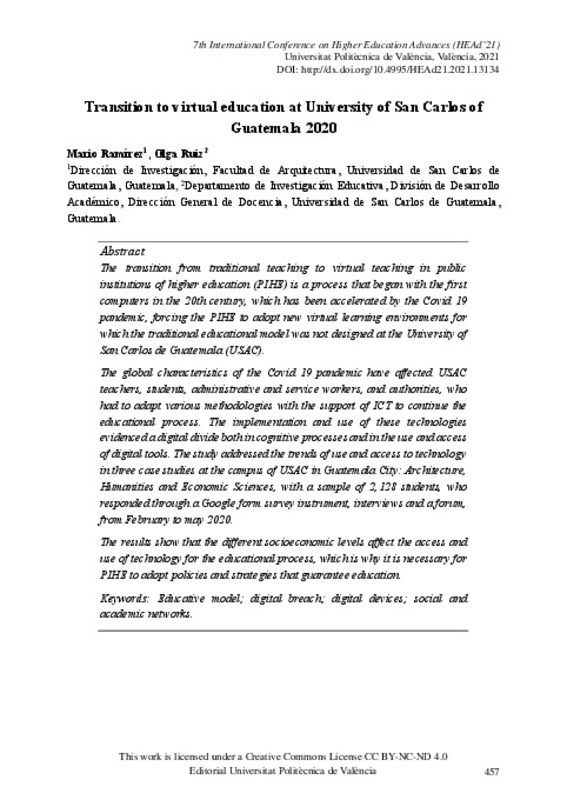JavaScript is disabled for your browser. Some features of this site may not work without it.
Buscar en RiuNet
Listar
Mi cuenta
Estadísticas
Ayuda RiuNet
Admin. UPV
Transition to virtual education at University of San Carlos of Guatemala 2020
Mostrar el registro sencillo del ítem
Ficheros en el ítem
| dc.contributor.author | Ramirez, Mario
|
es_ES |
| dc.contributor.author | Ruiz, Olga
|
es_ES |
| dc.coverage.spatial | east=-90.55336129999999; north=14.5873005; name=Universidad de San Carlos de Guatemala, Guatemala | es_ES |
| dc.date.accessioned | 2021-09-14T06:41:08Z | |
| dc.date.available | 2021-09-14T06:41:08Z | |
| dc.date.issued | 2021-07-26 | |
| dc.identifier.isbn | 9788490489758 | |
| dc.identifier.issn | 2603-5871 | |
| dc.identifier.uri | http://hdl.handle.net/10251/172326 | |
| dc.description.abstract | [EN] The transition from traditional teaching to virtual teaching in public institutions of higher education (PIHE) is a process that began with the first computers in the 20th century, which has been accelerated by the Covid 19 pandemic, forcing the PIHE to adopt new virtual learning environments for which the traditional educational model was not designed at the University of San Carlos de Guatemala (USAC). The global characteristics of the Covid 19 pandemic have affected USAC, who had to adapt various methodologies with the support of ICT to continue the educational process. The implementation and use of these technologies evidenced a digital divide both in cognitive processes and in the use and access of digital tools. The study addressed the trends of use and access to technology in three case studies at the campus of USAC in Guatemala City: Architecture, Humanities and Economic Sciences, with a sample of 2,128 students, who responded through a Google form survey instrument, interviews and a forum, from February to may 2020. The results are that different socioeconomic levels affect the access and use of technology for the educational process, which is why it is necessary for PIHE to adopt policies and strategies that guarantee education. | es_ES |
| dc.format.extent | 8 | es_ES |
| dc.language | Inglés | es_ES |
| dc.publisher | Editorial Universitat Politècnica de València | es_ES |
| dc.relation.ispartof | 7th International Conference on Higher Education Advances (HEAd'21) | |
| dc.rights | Reconocimiento - No comercial - Sin obra derivada (by-nc-nd) | es_ES |
| dc.subject | Higher Education | es_ES |
| dc.subject | Learning | es_ES |
| dc.subject | Educational systems | es_ES |
| dc.subject | Teaching | es_ES |
| dc.subject | Educative model | es_ES |
| dc.subject | Digital breach | es_ES |
| dc.subject | Digital devices | es_ES |
| dc.subject | Social and academic networks | es_ES |
| dc.title | Transition to virtual education at University of San Carlos of Guatemala 2020 | es_ES |
| dc.type | Capítulo de libro | es_ES |
| dc.type | Comunicación en congreso | es_ES |
| dc.identifier.doi | 10.4995/HEAd21.2021.13134 | |
| dc.rights.accessRights | Abierto | es_ES |
| dc.description.bibliographicCitation | Ramirez, M.; Ruiz, O. (2021). Transition to virtual education at University of San Carlos of Guatemala 2020. En 7th International Conference on Higher Education Advances (HEAd'21). Editorial Universitat Politècnica de València. 457-464. https://doi.org/10.4995/HEAd21.2021.13134 | es_ES |
| dc.description.accrualMethod | OCS | es_ES |
| dc.relation.conferencename | Seventh International Conference on Higher Education Advances | es_ES |
| dc.relation.conferencedate | Junio 22-23, 2021 | es_ES |
| dc.relation.conferenceplace | València, Spain | es_ES |
| dc.relation.publisherversion | http://ocs.editorial.upv.es/index.php/HEAD/HEAd21/paper/view/13134 | es_ES |
| dc.description.upvformatpinicio | 457 | es_ES |
| dc.description.upvformatpfin | 464 | es_ES |
| dc.type.version | info:eu-repo/semantics/publishedVersion | es_ES |
| dc.relation.pasarela | OCS\13134 | es_ES |








